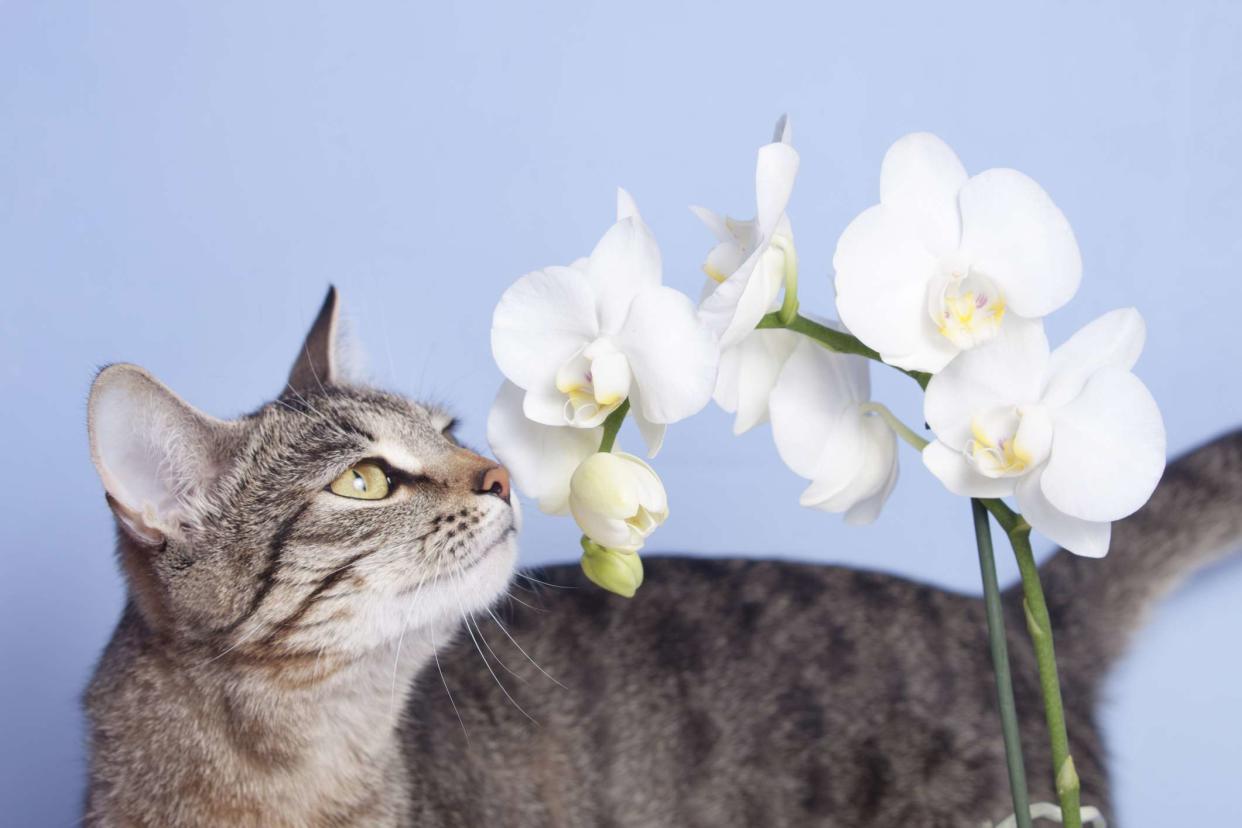Are Orchids Toxic to Cats?

Ukususha / Getty Images
It's not unusual for curious kitties to nibble on your houseplants. However, this habit can do more than make you want to weep with frustration. The American Animal Hospital Association (AAHA) lists plants as one of the most common pet toxins. So if your feisty feline has chowed down on the precious petals of your Phalaenopsis, you might wonder if orchids are toxic to cats or if they are pet-friendly houseplants.
If you're an orchid lover, the good news is that most orchid species aren't considered toxic to cats or dogs. But that doesn't mean your pet should have free rein to make a meal of these exotic beauties.
Most Orchids Aren't Toxic to Cats
The ASPCA lists the popular Phalaenopsis orchid genus as non-toxic to both dogs and cats. However, there are over 25,000 species in the Orchidaceae family. While there aren't reports of any species being seriously toxic to cats when ingested, that doesn't mean there isn't a chance that an unusual, untested species or hybrid could be problematic.
It's worth noting that lady's slipper orchids (Cypripedium spp.) are known to cause mild skin irritation in humans, so the same may be true for cats.
Nontoxic, but Still Problematic
Even though orchids are nontoxic to cats, you don't want your furry friend to be making a meal of them regularly. It will spoil the delicate beauty of these stunning plants, and ingesting too much vegetation isn't good for these obligate carnivores. Eating any part of the orchid or other plant can trigger stomach upsets and vomiting in cats.
Another risk is that there could be herbicides or pesticides on the plant that are toxic to cats. You won't know for sure what suppliers are using on their orchids. And, if your cat has a penchant for potting soil, this could contain toxic chemical fertilizer. When in doubt, repot your orchid into a fresh potting medium using a pet-safe organic fertilizer, such as fish emulsion.
If your orchid is missing lots of petals or leaves and your cat is the suspect, monitor them carefully. If they show signs of gastrointestinal upset or vomiting, this should pass within 24 hours without veterinary assistance. However, if the vomiting is severe, isn't improving after a day, or is accompanied by other worry symptoms (such as difficulty breathing, seizures, or an unsteady gait), contact your vet immediately. This is especially important if your furry family could have ingested a plant that is toxic to cats. Never try to induce your cat to vomit unless you have specific instructions from a veterinary professional.
Why Are Cats Attracted to Orchids?
Plant eating is common in domestic cats. Previously, experts hypothesized this often occurs when cats feel unwell and want to make themselves vomit. However, studies suggest it isn't usually triggered by tummy upsets but is an instinctual behavior.
Some cats might just be drawn to the taste, fragrance, or falling petals of your orchids, and others may be nibbling on them for fun or to relieve boredom or stress.
How to Prevent Your Cat From Eating Your Orchid
If you don't want your kitty killing off your cherished orchid, or any other carefully curated houseplants, it's all about management and addressing underlying needs. Here are some ideas for protecting your plants from frisky felines:
Offer alternative enrichment: Investing in stimulating toys and puzzle feeders can help when you're cat is eating plants out of boredom.
Cat-proof your plant: Cats are master acrobats, so putting your orchid on a high shelf might not be enough—and it could result in your cat dropping your delicate plant from a high height. Consider where your orchid can get the light it needs, but your cat can't connect with it.
Get some cat grass: Redirect your plant-loving puss to more appropriate vegetation whenever they are showing interest in grazing on the petals of your orchid.
Help stressed cats to relax: Cats might chew on plants as a way to alleviate stress. If you think your cat is anxious, consider calling out a professional pet behaviorist. They can help you determine the stress triggers and how to help your cat feel more at ease.
Frequently Asked Questions
What happens if a cat eats an orchid?
Usually, there isn't any need to panic if your kitty nibbles on the petals or leaves of your orchid. Orchids commonly kept as houseplants are nontoxic to cats. However, if they strip the entire plant of all its leaves and blooms, this could cause a stomach upset. If your cat has severe or protracted vomiting or diarrhea, don't delay getting veterinarian advice.
Are all orchids cat safe?
There are thousands of orchid species out there, and not all of them have been tested to establish if they are cat safe. If in doubt, stick with species we know for sure are cat safe. Plants in the phalaenopsis genus are nontoxic to cats and are popular, readily available, and easy-to-care-for orchids.
What is the most toxic flower to cats?
While orchids and cats can share the same household harmoniously, some plants are less feline friendly. Some of the most toxic houseplants to cats are certain true lily species. These include Tiger, Day, Asiatic, Japanese Show, and Easter lilies. Ingestion of as little as two or three petals can be enough to result in fatal kidney failure.
Read Next:Are Spider Plants Toxic to Cats?

